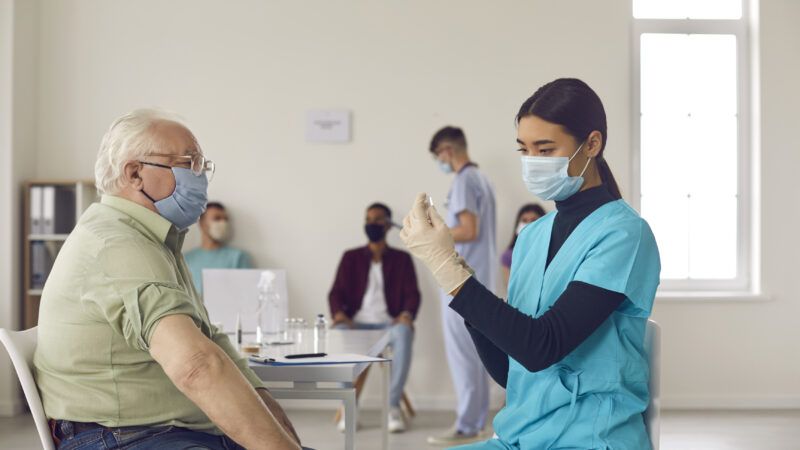The COVID-19 vaccines developed by Pfizer/BioNTech and Moderna are about 95 percent effective at preventing symptomatic illness. What does that really mean? It does not mean that 95 percent of people are protected from disease with the vaccine, as Oxford Centre for Global Health Research infectious disease specialist Piero Olliaro recently explained in the Lancet. Olliaro notes that an earlier ambiguous editorial in the Lancet may have lead readers to make just such a mistaken inference.
What the 95 percent figure really means here is that vaccinated people in the clinical trials had a 95 percent lower risk of getting COVID-19 compared with the unvaccinated control group participants. That means that vaccinated people were 20 times less likely than the control group to get COVID-19.
Olliaro looked at what a 95 percent vaccine efficacy rate would mean in a hypothetical case in which a population of 100,000 people have all been vaccinated. Applying the 1 percent rate at which unvaccinated folks became ill during the vaccine trials over three months suggests that 1,000 people in an unvaccinated population of 100,000 would fall ill. But because all 100,000 people are vaccinated, the actual rate in the vaccinated population would be just 50 cases (0.05 x 1,000 = 50 cases).
As Olliaro pointed out:
The mRNA-based Pfizer and Moderna vaccines were shown to have 94–95% efficacy in preventing symptomatic COVID-19, calculated as 100 × (1 minus the attack rate with vaccine divided by the attack rate with placebo). It means that in a population such as the one enrolled in the trials, with a cumulated COVID-19 attack rate over a period of 3 months of about 1% without a vaccine, we would expect roughly 0·05% of vaccinated people would get diseased.
There is even more good news about COVID-19 vaccine efficacy. As LiveScience reports, the Pfizer/BioNTech, Moderna, and Johnson & Johnson clinical trials all found that their vaccines were essentially 100 percent effective in preventing severe disease six to seven weeks after trial participants had received a first/single dose. As biotech journalist Anna Nowogrodzki notes, "Zero vaccinated people in any of the trials were hospitalized or died of COVID-19 after the vaccines had fully taken effect." Now that's the kind of vaccine efficacy that we can all cheer.
Further good news is that Pfizer/BioNTEch and Moderna, which have so far distributed 75 million doses of their vaccines in the United States, are now pledging to steeply ramp up their vaccine deliveries to 140 million additional doses by the end of next month. Johnson & Johnson, whose one-shot vaccine could be approved by the Food and Drug Administration by this weekend says that it can deliver 20 million doses in the United States by the end of March. Which vaccine to take? The first one you can get.

No comments:
Post a Comment